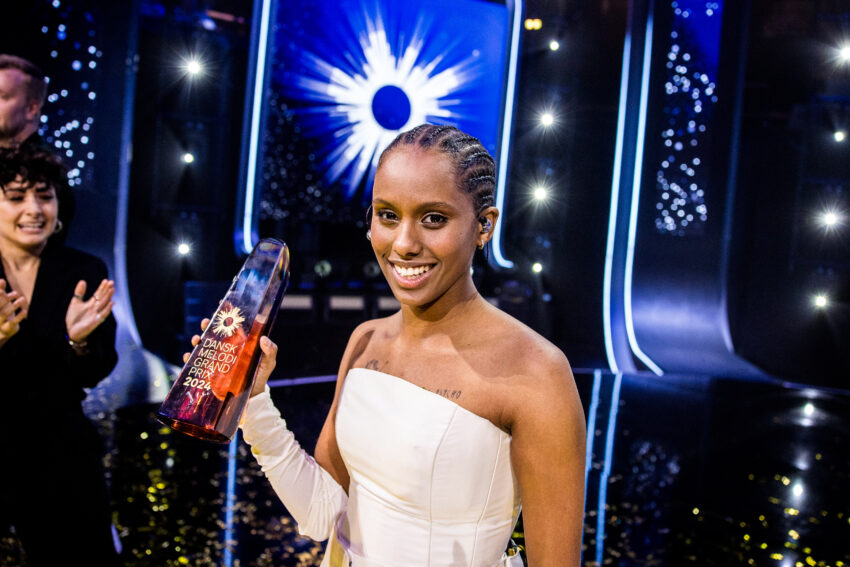The Dansk Melodi Grand Prix 2024, Denmark’s historic pre-selection event, has drawn to a close. Denmark has selected its flag bearer for the upcoming May Eurovision 2024 in the Swedish city of Malmö. A decision equally influenced by both the jury and televoting has led to Saba’s victory with the song “Sand,” winning both voting categories.
The Danish pre-selection took place at the Koncerthuset in Copenhagen, hosted by the lively Sara Bro and Stéphanie Surrugue. Eight candidates competed fiercely for victory and the ticket to Eurovision 2024, each bringing a unique style and personality to the stage.
The competition initially narrowed down to three super finalists, with the ultimate decision split evenly between the jury and televoting, each accounting for 50% of the decision. The jury comprised 20 members in total, including 10 from Denmark and 10 international members.
This resulted in the triumph of the song “Sand,” masterfully performed by the singer Saba.
| Artist | Song | Jury | Televote | Total |
|---|---|---|---|---|
| 1st | Saba | “Sand” | 22 | 37 |
| 2nd | Basim | “Johnny” | 15 | 34 |
| 3rd | Janus Wiberg | “I Need Your Love” | 13 | 29 |
| X | Aura Dione | “Mirrorball Of Hope” | NQ | X |
| X | CHU CHU | “The Chase (Zoom Zoom)” | NQ | X |
| X | RoseeLu | “Real Love” | NQ | X |
| X | Stella | “Sign Here” | NQ | X |
| X | UBLU | “Planetary Hearts” | NQ | X |
Who is Saba?
Saba Lykke Oehlenschlæger found herself on stage somewhat by chance. Her twin sister landed the lead role in the musical Hair, but due to pregnancy, she had to step down, leaving Saba to fill in, a significant turn of events.
For her, stepping onto a stage poses significant challenges as she struggles with bipolar disorder, making it difficult to regulate her mood, especially in front of an audience. She has been hospitalized multiple times, engages in self-harm, and is highly particular.
Despite the medications aiding in control, the Danish pre-selection will undoubtedly be a challenge for her.
Denmark at Eurovision
Denmark marks its 53rd participation in Eurovision this year, with intermittent absences over the years and a total of 44 appearances in Grand Finals. It made its debut in 1957, securing a third place, and the years following were quite successful for the country, consistently ranking among the top 10 contestants and clinching its first victory in 1963 with the duo Grethe and Jorgen Ingmann and their song “Dansevise.”
After a ten-year absence from 1967 to 1977, the country returned, achieving several top 10 finishes, two third places, and another withdrawal in 1994, which occurred again in the 1998 edition. They achieved a golden double, as in 2000, against all odds, the duo formed by the Olsen Brothers won with their iconic “Fly on the Wings of Love,” and the following year, they finished second as hosts.
This streak came to an abrupt end in 2002 when they finished last and did not participate in 2003. Since then, they have participated continuously with mixed results, notably in 2013 when they secured their third victory with Emmelie de Forest and her “Only Teardrops,” which interestingly occurred in the edition where Malmö was the host city, as it is this year.
Moreover, we can draw a positive balance in the relationship between Denmark and Sweden as hosts, as they have won on Swedish soil twice (2000 and 2013). In the 1985 edition, they secured an 11th place, and in 1992, a 12th. The only edition where luck eluded them was Stockholm in 2016, where they failed to qualify for the Grand Final.
Since Eurovision’s return after the COVID-19-paralyzed edition of 2020, Denmark has not managed to conquer the Grand Final with any of its entries. Last year, Reily and his “Breaking My Heart” finished in 17th place with only 6 points.

